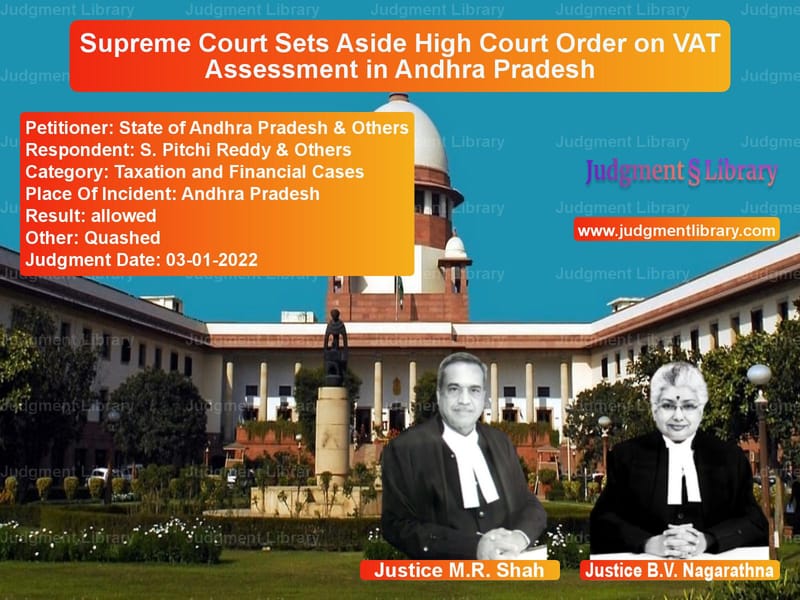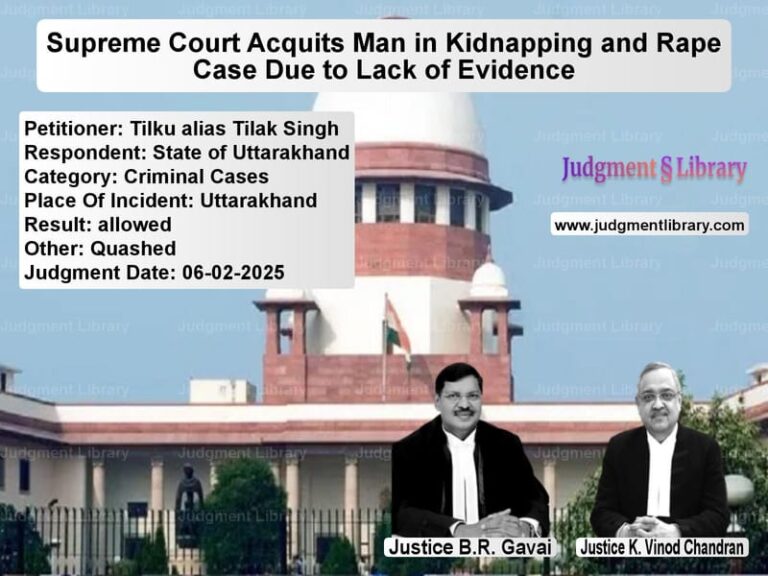Supreme Court Sets Aside High Court Order on VAT Assessment in Andhra Pradesh
The case of State of Andhra Pradesh & Others vs. S. Pitchi Reddy & Others is a landmark ruling on VAT assessment disputes and the jurisdiction of courts in tax matters. The Supreme Court set aside the judgment of the High Court of Judicature at Hyderabad, which had quashed fresh assessment orders passed by the Commercial Tax Officer. The case primarily dealt with the principle of exhausting alternative remedies before invoking writ jurisdiction under Article 226 of the Constitution of India.
Background of the Case
The respondents in this case were registered VAT dealers in Andhra Pradesh. The Commercial Tax Officer assessed tax liabilities for different assessment years and issued assessment orders on July 25, 2012. The following table summarizes the assessed tax amounts:
| Civil Appeal No. | Assessment Year | Assessed Tax | Date of Order |
|---|---|---|---|
| 7768 of 2021 | 2010-2011 | ₹9,10,608 | 25.07.2012 |
| 7771 of 2021 | 2008-2009 | ₹7,07,031 | 25.07.2012 |
| 7770 of 2021 | 2009-2010 | ₹10,73,119 | 25.07.2012 |
| 7769 of 2021 | 2008-2009 | ₹10,25,321 | 25.07.2012 |
The dealers appealed the assessment orders before the Appellate Deputy Commissioner (CT), Guntur, who remanded the cases to the Assessing Officer (AO). Meanwhile, the Commissioner of Commercial Taxes initiated suo moto revision proceedings against the appellate authority’s order. While these revision proceedings were pending, the AO issued fresh assessment orders.
Instead of appealing against the fresh assessment orders, the dealers directly approached the High Court by filing writ petitions under Article 226 of the Constitution of India. The High Court quashed the fresh assessment orders, ruling that they were passed while suo moto revision proceedings were pending before the Commissioner of Commercial Taxes.
Arguments of the Petitioner (State of Andhra Pradesh)
The State of Andhra Pradesh, through its counsel, made the following arguments:
- Alternative Remedy Available: The High Court should not have entertained the writ petitions as the dealers had an alternative remedy of filing appeals before the first appellate authority.
- Validity of Fresh Assessment Orders: The fresh assessment orders were passed pursuant to the remand order of the first appellate authority and were not dependent on the outcome of the pending suo moto revision proceedings.
- Jurisdiction of the High Court: The High Court erred in quashing the fresh assessment orders without considering their merits.
Arguments of the Respondents (Dealers)
The dealers argued that:
- Jurisdictional Error: The AO lacked jurisdiction to pass fresh assessment orders while suo moto revision proceedings were pending before the Commissioner.
- Violation of Principles of Natural Justice: Since the revision proceedings had not concluded, the fresh assessments were premature and should be set aside.
- Power of Writ Jurisdiction: The High Court had the authority to intervene where there was a clear abuse of process.
Supreme Court’s Observations
The Supreme Court, led by Justices M.R. Shah and B.V. Nagarathna, made the following key observations:
- Exhaustion of Alternative Remedies: The High Court should not have entertained the writ petitions as the dealers had a statutory remedy of appeal before the first appellate authority.
- Validity of Fresh Assessments: The fresh assessment orders were passed pursuant to the remand by the first appellate authority. Their validity was not contingent upon the outcome of the suo moto revision proceedings.
- High Court’s Error: The High Court quashed the fresh assessment orders without considering their merits, which was an incorrect application of writ jurisdiction.
Final Judgment
The Supreme Court set aside the High Court’s decision and reinstated the fresh assessment orders. The judgment stated:
“The judgment and orders passed by the High Court quashing and setting aside the fresh assessment orders in the writ petitions under Article 226 of the Constitution of India are unsustainable.”
Implications of the Judgment
This ruling has significant implications for tax litigation in India:
- Reinforcement of the Doctrine of Alternative Remedies: The decision affirms that courts should not entertain writ petitions where an effective statutory remedy is available.
- Scope of Writ Jurisdiction: The ruling clarifies that the High Court should not interfere in tax matters unless there is a violation of fundamental rights or principles of natural justice.
- Ensuring Proper Tax Administration: The judgment upholds the power of tax authorities to reassess cases in accordance with statutory provisions.
With this ruling, the Supreme Court has reinforced the principle that judicial intervention in tax matters should be exercised with caution, ensuring that statutory remedies are first exhausted before resorting to constitutional writ jurisdiction.
Petitioner Name: State of Andhra Pradesh & Others.Respondent Name: S. Pitchi Reddy & Others.Judgment By: Justice M.R. Shah, Justice B.V. Nagarathna.Place Of Incident: Andhra Pradesh.Judgment Date: 03-01-2022.
Don’t miss out on the full details! Download the complete judgment in PDF format below and gain valuable insights instantly!
Download Judgment: state-of-andhra-prad-vs-s.-pitchi-reddy-&-ot-supreme-court-of-india-judgment-dated-03-01-2022.pdf
Directly Download Judgment: Directly download this Judgment
See all petitions in Tax Refund Disputes
See all petitions in Banking Regulations
See all petitions in Income Tax Disputes
See all petitions in Judgment by Mukeshkumar Rasikbhai Shah
See all petitions in Judgment by B.V. Nagarathna
See all petitions in allowed
See all petitions in Quashed
See all petitions in supreme court of India judgments January 2022
See all petitions in 2022 judgments
See all posts in Taxation and Financial Cases Category
See all allowed petitions in Taxation and Financial Cases Category
See all Dismissed petitions in Taxation and Financial Cases Category
See all partially allowed petitions in Taxation and Financial Cases Category







